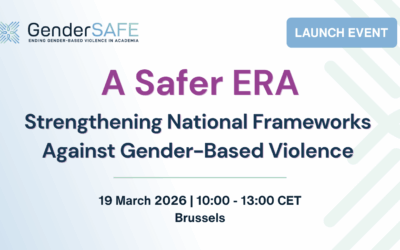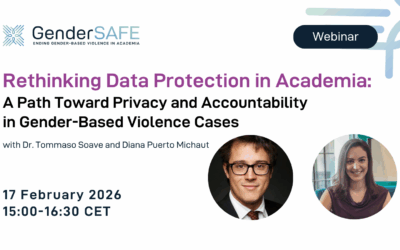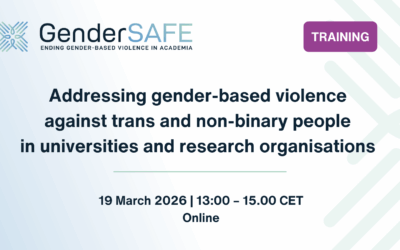GenderSAFE Webinar on
Technology-Facilitated Abuse in Academia
with Arpita Chakraborty, in conversation with Ayşe Gül Altinay
Watch the replay now!
This webinar explores the issue of technology-facilitated gender violence and its presence in academia. Participants will gain insights into the main conceptual frameworks and priorities aimed at addressing technology-facilitated gender violence in research and academia, getting concrete advice and suggestions by practices already implemented in institutions across the EU.
We encourage participants to familiarise themselves with the institutional policies of their organisations/institutions, and bring examples of practices that can be inspiring for others.
Learning objectives
- Gain a common understanding of concepts related to technology-facilitated gender-based violence and understand its impact in academia.
- Highlight its specific characteristics.
- Get informed about inspiring practices for setting up and implementing institutional policies to address technology-facilitated gender-based violence in academia adopted by European and Member States higher education institutions and research organisations.
Who is it for?
- Gender equality officers/focal points, equality and/or diversity officers
- Human resources officers
- Gender equality plan implementing teams
- Health and safety officers
- Head of Departments/Units in charge or involved in gender-based violence
- Trainers on the topic of gender-based violence in academic settings
The webinar is addressed to those at the beginning stages of creating and implementing a policy framework to address technology-facilitated violence in academia. As seats are limited, priority will be given to individuals at the initial stages of developing and implementing policy to address gender-based violence within their institution and correspond to the profile of participants. Preference will be given to individuals from countries participating in Horizon Europe, with special consideration for registrants from ‘Widening countries’ as defined by the European Commission. We kindly ask for your understanding as we strive to include a diverse range of participants.
Introducing the panel
Arpita Chakraborty is the Vice Director of the Institute for Research on Genders and Sexualities at Dublin City University. She is specifically interested in looking at how ideas around gender, masculinities, and caste migrate transnationally and how it affects migrant women of colour in Europe. She has collaborated with civil society partners outside academia, narrowly defined, in the co-production of knowledge and the communication of research findings for societal impact Her work has been published and accepted for publication in leading international peer-reviewed publications including Critical Studies on Security, International Feminist Journal of Politics, Economic and Political Weekly, Religion and Gender. Since finishing her PhD in 2019, she has led three research projects worth more than €500,000 funded by the Irish Research Council, and Ireland India Institute, and collaborated on international research projects with colleagues at Goldsmiths, University of London, Tampere University, Lucerne University, ActionAid Ireland, ActionAid Nepal. She has created and taught modules on postcolonial politics, gender studies and masculinity studies. In her former role as an Editor, she oversaw the production of 13 top-rated academic journals from Sage Publications.
Ayşe Gül Altınay has 30 years of experience in research, teaching and activism and has recently retired as Professor of Anthropology and Gender Studies from Sabancı University, where she served as a co-creator of the Sexual Harassment Policy (2007) and the Gender Equality Action plan (2021), as well as the co-founder and Director of SU Gender (Gender and Women’s Studies Center of Excellence). Having published extensively on gender-based violence, militarism, genocide and gendered memories of war and political violence, Ayşe Gül’s recent work focuses on transformative activism and feminist/queer re-imaginings of life and ecology. She currently serves as the Chair of EarthSky Solidarity Association in Istanbul. Through her teaching, research and activism, Ayşe Gül is passionate about opening co-creative spaces that weave personal, collective and planetary journeys of reckoning, healing and transformation.



